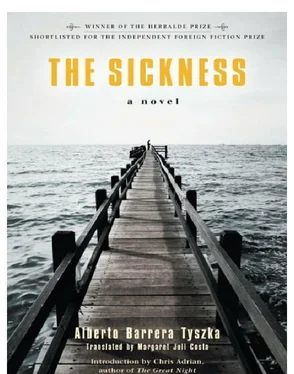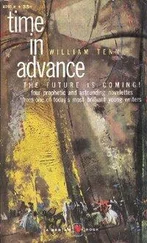This is the reason for my letter, Doctor. It’s the only way I have now of asking you for an appointment. My situation remains the same, with my health deteriorating by the day. Reply directly to this address. Please, trust no one else. I need to see you as soon as possible.
Thank you for your attention and, as I say, I’m here, waiting for your reply.
Ernesto Durán
Blood is a terrible gossip, it tells everyone everything, as any laboratory technician knows. Hidden inside that dark fluid, stored away in little tubes, lie murky melodramas, characters brought low, or sordid stories on the run from the law. When his father fainted, Andrés insisted on him having a whole battery of blood tests. His father protested. He tried to make light of the matter. He preferred the term “dizzy spell” to “fainting fit,” and insisted on this almost to the point of absurdity.
“It was just a dizzy spell,” he kept repeating, blaming it on the humidity, the summer heat.
It was, according to him, the fault of the climate rather than an indication of some physical ailment. But the truth of the matter is, he had collapsed on the floor like a sack of potatoes in front of the woman who lived in apartment 3B. They’d been talking about something or other — neither of them could remember what — when suddenly his father collapsed, and the neighbor started screaming hysterically.
“I thought he’d died. He was so pale! Almost blue! I didn’t want to touch him because I was afraid he might already be cold! I didn’t know what to do! That’s why I started screaming!” says the neighbor.
A few seconds later, his father, once he’d recovered consciousness, had tried to calm her down and reassure her that everything was fine, that nothing very grave had happened. Perhaps he had told her, too, that it was just a dizzy spell. Nevertheless, that same afternoon, the neighbor phoned Andrés to let him know what had happened.
“The old busybody!” his father grumbled when Andrés arrived to pick him up and drive him to the hospital.
While the nurse was taking the blood samples, Andrés suddenly noticed that his father had grown smaller. It had never occurred to him before to notice his size, but seeing his father there, arm outstretched, eyes fixed on the ceiling, so as not to have to look at the needle, it seemed to him that his father had become shorter, had lost height. Javier Miranda is a fairly tall man, almost five foot ten. Tall and slim, with a rather athletic build. He always walks very erect, as if his body didn’t weigh on him at all. Despite his age and the fact that he’s gone gray, he looks cheerful and healthy. His curly hair has won out over any incipient baldness. His skin is slightly tanned, the color of light clay. His eyes are brown too. He’s never smoked, only drinks occasionally, goes for a walk every morning in the park — Parque Los Caobos — avoids fatty foods, has fruit and muesli for breakfast, and every night eats seven raw chickpeas as a way of combating cholesterol. “What went wrong?” he seemed to be asking himself. He had sidestepped time rather successfully. Everything had been going relatively well until, one afternoon, that inexplicable fainting fit had stopped him in his tracks. It was that brief wavering of his equilibrium that had brought him to this place and abruptly transformed him into this weak, wounded, small — yes, smaller — person. The words “Sickness is the mother of modesty” came unbidden into Andrés’s mind. They appear in Robert Burton’s The Anatomy of Melancholy , published in 1621. It’s required reading in the first term of medical school. The quote bothered him though. It struck him as not so much sad as stupid; behind it lay the desire to make of sickness a virtue. He looked at his father again. Isn’t sickness a humiliation rather than a virtue?
Up until now, his father’s health had only ever succumbed to the occasional common cold, and a brief urinary infection two years ago, but that was all. He enjoyed enviably good health and, so far, there had been no other worrying signs. Andrés, however, had a bad feeling. The whole situation produced in him a peculiar sense of apprehension. With no evidence on which to base that feeling, he thought for the first time that the worst could happen, that it might already be happening. It irritated him to feel hijacked by a mere hunch, to be taken hostage by something as irrational and unscientific as a bad vibe. His father glanced across at him. Andrés didn’t know what to say. It suddenly struck him as pathetic that the fate of a sixty-nine-year-old man could be summed up in just four tubes of dark fluid, O Rh positive. What would his father be feeling at that moment? Resigned? Ready to accept that he was reaching a preordained destiny, that this was a natural conclusion to his life; that now he was entering a stage when people would stick needles in him and when he would inhabit a world dominated by the aseptic smell of laboratories? He again looked hard at his father and was filled by a frightening sense that it was no longer his father meekly putting up with being pricked, touched, and bled, it was just a body. Something apart. An older, more vulnerable body in which his father’s spirit writhed in protest. Spirit was an odd word. Andrés hadn’t used it in ages. He felt that he was using it now for the first time in years.
The two of them. For almost as long as he can remember, it has been just the two of them. His mother died when he was ten. For almost as long as he can remember, Andrés has been the only son of a widower, of a strong man capable of struggling with terrible grief, with great loss. His mother died in an air crash, on a flight from Caracas to Cumaná. The plane was airborne for only a matter of minutes before it nosedived. It was a national tragedy. The work of the rescue team was hard and, for the most part, fruitless. A special room was set up in the Hospital de La Guaira, where the victims’ families could try to identify what little was left: a foot, half a bracelet, the crown of a tooth. . His father returned from the hospital that night, looking drawn and ashen. He talked for a while in the kitchen with the other members of the family, then picked up his son and left. Andrés already knew what had happened. Despite his aunts’ attempts to protect him, he had managed to elude them and, in secret, had watched the events on television. When his father, his eyes red from crying, went to enormous lengths to soften the news he had to give him and told him that Mama had gone away on a long, long journey, a journey from which she wouldn’t come back, Andrés, still confused, fearful, and bewildered, simply asked if his mother had been on the plane that had fallen into the sea. His father looked at him uncertainly, then said, “Yes,” and put his arms around him. Andrés can’t be sure now, but he thinks they cried together then.
For a long time, Andrés used to dream about his mother. It was the same dream over and over, with very few variations: the plane was at the bottom of the sea, not like a plane that has crashed, but like a sunken ship; it was quite intact, sleeping among the seaweed and the fish and the shadows, which, like cobwebs, danced across the dull sand. Inside the plane, a large oxygen bubble had formed on the ceiling. It was a very fragile bubble that was slowly shrinking. His mother was trying to swim along with her head inside the bubble so that she could breathe. She appeared to be the sole survivor, there was no one else, only fish of different colors and sizes that cruised past her with an air of extraordinary, almost bored serenity. It was odd, but in the dream, his mother was wearing a swimsuit and shoes — an orange two-piece swimsuit and a pair of black leather moccasins.
As time passed, his mother grew more desperate. Several times she struck the ceiling of the plane, making a distant, metallic sound, like a tin can being dragged through the sea. She peered out through a window onto nothing, only dark water, a liquid penumbra no eye could penetrate. The sea had no memory, it destroyed everything too quickly for that. Then his mother, beside herself, almost suffocating, beat harder on the ceiling of the plane and cried out: “Andrés! Andrés! I’m alive! Come and get me out of here!”
Читать дальше












